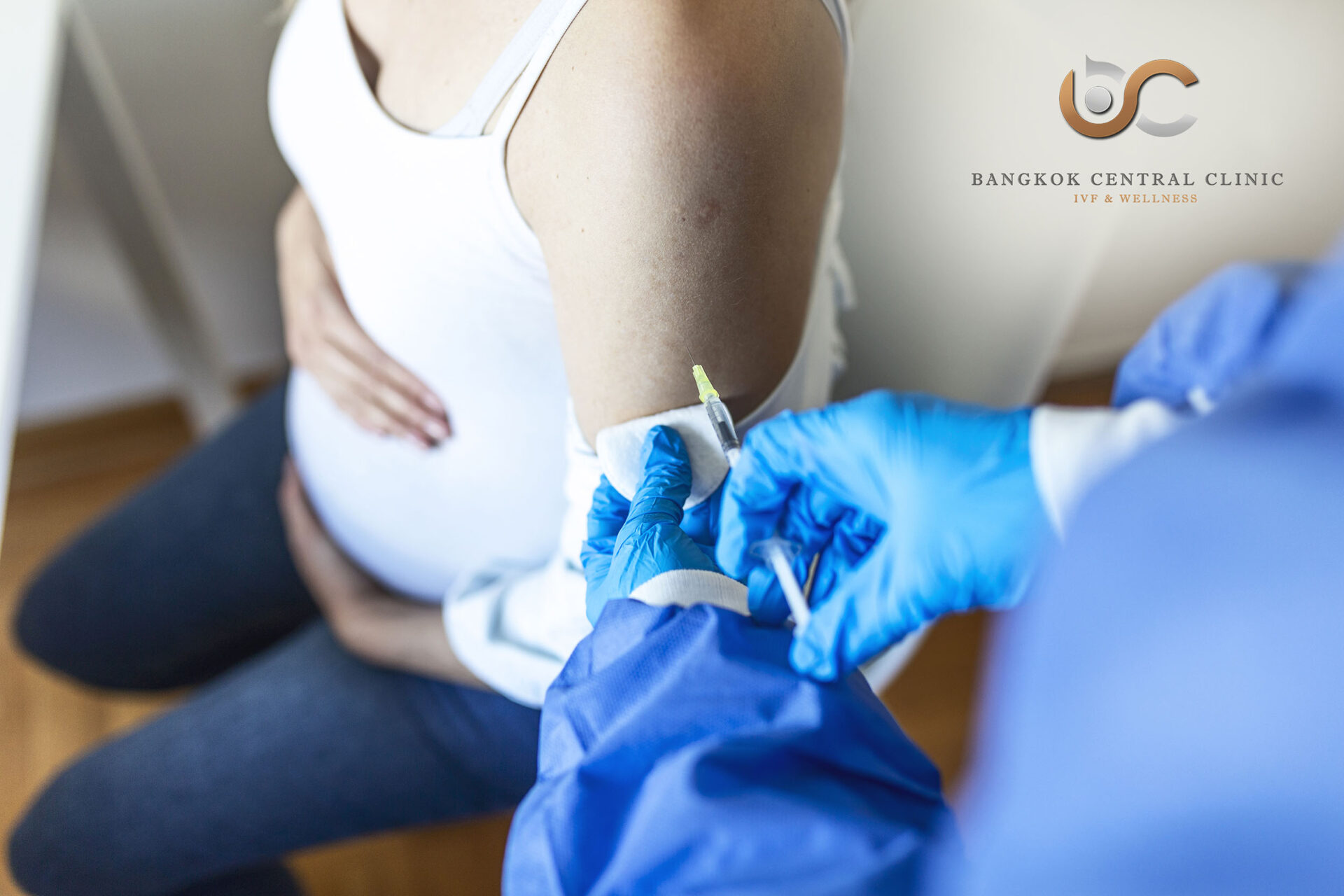HIGHLIGHTS
20 December 2020
5 yoga poses for couples to Enhance your relationship with your partner, level up your happiness in bed.
READ MORE20 December 2020
7 the procedure takes care of yourself and the wife before collecting eggs-collecting sperm.
READ MORE20 December 2020
Protein, a key nutrient of a woman, preparation for pregnancy- preparation for an egg collection.
READ MORE
Why Is It Important for a Health Check Up for Both Male and Female Before Getting Pregnant?
READ MORE
Destination IVF: Why Bangkok is a Premier Choice for International Patients Seeking Fertility Treatment
READ MOREDoes The Covid-19 Vaccine Affect IVF?
 23 Feb 2022
23 Feb 2022

In vitro fertilisation (IVF) is an assisted reproductive technology that is used to help people struggling with fertility problems become pregnant. The treatment involves multiple procedures that ultimately culminate in quality screened embryos being transferred into the uterus of the woman.
It is a time-consuming, financially taxing, physically, emotionally and mentally challenging process for hopeful parents. Given all the time and effort that goes into it, it is to be expected that the parents would want to avoid anything that would put them in danger of failure.
As the global pandemic raged, hope came in the form of vaccines that have been found helpful in reducing the risk of suffering severe illness. However, there have been some concerns surrounding possible side effects from these injections.
Many couples that have been undergoing IVF treatment and those that have successfully conceived have questioned whether it would be safer to postpone taking the vaccine till after they have given birth. Even those that are yet to start the process do wonder if it may impact their fertility, and thus their ability to have children later on.
Here we will seek to address these concerns, offering recommendations that will hopefully clear up misconceptions and allow prospective parents to follow the safest and healthiest path to conception.
Covid-19 Vaccine and Fertility
Research has shown that Covid-19 vaccines do not interfere with fertility. A recent study published in Obstetrics & Gynaecology found that the IVF treatment outcomes for vaccinated and unvaccinated people did not differ. This research looked into outcomes for the different procedures including ovarian stimulation, egg quality and embryo development between the two groupings and found there was no difference, meaning that taking the vaccine did not impact fertility.
This research helped allow doctors to monitor and observe the outcomes at the different stages of IVF treatment before ascertaining that the vaccines did not impact reproductive outcomes. Only patients that had been fully vaccinated at least 14 days before starting treatment were considered for the study. This is just one of many studies that have reinforced the recommendation from multiple medical bodies around the world for people to take up the vaccines as they are generally safe.
The Centers for Disease Control and Prevention (CDC) has also recommended that people who are breastfeeding, pregnant or trying to get pregnant should take the Covid-19 vaccine. Those that qualify to take booster shots are also being advised to get them. The CDC has said that the benefits of taking the Covid-19 vaccine outweigh any potential side effects during pregnancy. It helps to boost a person’s immune system in combating the virus should the person become infected. There is no increased risk of miscarriage associated with taking the vaccines.
Taking mRNA vaccines such as Pfizer-BioNTech and Moderna has been found to help reduce the risk of getting infected while pregnant. When administered, the vaccines do not give a person Covid-19. They do however help the body to build up antibodies that may help protect mother and child. A similar lack of adverse pregnancy-related outcomes was found where the J&J/Janssen Covid-19 vaccine was administered.
There were also false rumours that a certain spike in protein caused by the virus was similar to that which was associated with the growth and attachment of the placenta during pregnancy. It was claimed that vaccines were designed to fight against this spike and could therefore cause disruption to pregnancy. It has however been established that these are different spike proteins and that the vaccine does not affect fertility, IVF treatment, or any resulting pregnancy.
Men do not also have to fear Covid-19 vaccines. It has already been found that vaccines have no impact on male fertility. While the virus itself can have a temporarily cause sterility, the vaccines have no effect and can safely be taken by men. Vaccines do not cause sterility. The vaccines will help reduce the risk of infections and suffering severe illness.
Covid-19 Effect On Pregnancy
Pregnant women that become infected with the Covid-19 virus while unvaccinated are at an increased risk of suffering from severe illness as compared to those that are not pregnant. The level of severity may require that they be hospitalised, placed in ICU and potentially on breathing apparatus like ventilators if they suffer breathing problems. in the most severe of cases, there is the potential of not recovering and dying.
Those that are pregnant with symptomatic infection are also at increased risk of pregnancy complications such as premature birth and stillbirths. More so for those that have other medical conditions that place them at further risk such as gestational diabetes. This risk is still heightened even with the Omicron variant.
Given this increased risk, medical bodies and governments are advising even those that are already pregnant should get fully vaccinated as soon as possible. Getting fully vaccinated while pregnant will give a chance for antibodies to develop and be passed on to your child. These antibodies may help to reduce the risk of hospitalization in infants that are 6 months or younger. This means the benefits carry on even after childbirth. You may discuss your concerns with your doctor, but do consider it a matter of urgency to be addressed.
Covid-19 Vaccine After Childbirth
If you have already delivered your child, you should still get vaccinated if you have not done so already. The same applies whether you are breastfeeding or not. It is still safe to take the vaccine even if you are nursing the baby. While no official study has been done on this, some medical bodies including the CDC, the American College of Obstetricians and Gynaecologists (ACOG), and the Society for Maternal-Foetal Medicine (SMFM) have noted that there have been no adverse safety issues raised from nursing mothers and their babies.
Since the vaccines do not contain the live virus, there is also no risk mother or child will become infected from them. If you are not vaccinated, you can take the vaccine and continue nursing without worry. You will merely be passing on virus antibodies to your baby through breastmilk, which will help to protect them from the risk of severe illness. Currently is it not recommended for babies or infants to receive the vaccine yet. Consult with your paediatrician to learn when it will be permitted for your child to receive the vaccine.
HIGHLIGHTS
20 December 2020
5 yoga poses for couples to Enhance your relationship with your partner, level up your happiness in bed.
READ MORE20 December 2020
7 the procedure takes care of yourself and the wife before collecting eggs-collecting sperm.
READ MORE20 December 2020
Protein, a key nutrient of a woman, preparation for pregnancy- preparation for an egg collection.
READ MORE
Why Is It Important for a Health Check Up for Both Male and Female Before Getting Pregnant?
READ MORE


















